The Mummy Read online
Page 39
"My dear, you mustn't display that much money at this time of night," the woman said to her. She bent down and gathered up the loose pieces. "Come inside. Are you all alone?"
Oh, but it was quite lovely in here; she touched the rich fabric of the small gilded chair. And behold, more of the statues she'd seen in the window, and these were decked not only with rich flowing silks, but furs as well. The long strip of white fur in particular attracted her.
"I want this," she said.
"Of course, my dear, of course," said the proprietress.
She flashed her sweetest smile at the baffled woman. ' 'Is this ... is this . . . for the opera ball?" she asked.
"Oh, it would be perfectly lovely! I shall wrap it for you."
"Ah, but I need a gown, you see, and those slippers, and I need pearls and rubies, if you have them, for you see, I have lost all my finery, I have lost my jewels.''
"We shall take care of you! Please be seated. Now, what would you like to see in your size?"
It was going to work. It was an absurd story: Henry breaking into the Museum of Antiquities to steal a mummy in order to pay his debts. But the simple fact was-and he must remember this-the truth was even more absurd! No one would believe the truth at all.
He rang his old friend Pitfield as soon as he reached the suite.
"Tell him it's Elliott Rutherford, I'll hold on for him. Ah, Gerald. I'm sorry to interrupt your dinner. It seems I'm in a bit of legal trouble here. I think Henry Stratford's mixed up in it. Yes. Yes, this evening if you could. I'm at Shepheard's, of course. Ah, wonderful, Gerald. I knew I could count on you. Twenty minutes from now. In the bar."
He looked up to see Alex coming through the door as he put down the phone.
"Father, thank God you're back. They've confiscated our passports! Julie is frantic. And Miles has just been at her with another wild story. Some poor American murdered at the pyramids, and an English fellow killed outside the International Cafe."
"Alex, pack your trunk," he said. "I've already heard that whole story. Gerald Pitfield's on his way over. He'll have your passports back for you before morning, I promise, and then you and Julie are to be on the train."
"You'll have to tell her that, Father."
"I will, but right now I have to see Pitfield. Give me your arm, and help me to the lift."
"But, Father, who is responsible . . . ?"
"Son, I don't want to be the one to tell you. And certainly not the one to tell Julie. But it looks as if Henry may be deeply involved."
Quiet up here. One could scarcely hear the music from the lighted windows below. She had crept up the stairs all alone, wanting only to see the stars, and be away from the unwelcome knocks and the unwelcome jangling of the phone.
And there was Samir, standing there at the edge of the roof, looking out over the minarets and the domes, and the myriad little rooftops of Cairo. Samir, looking up at the heavens as if he were in prayer.
He slipped his arm around her as she approached.
"Samir, where is he?" she whispered.
"He will send word to us, Julie. He will not break his promise."
This had been an exquisite choice: pale green "satin" with rows of pearl "buttons" and layers of "Brussels lace." And the loose fur wrap looked quite becoming, said the woman, and the woman should know, should she not?
"Your hair, so beautiful, it seems quite a sin to tie it up, but my dear, you really should, you know. It looks rather . . . Perhaps tomorrow I can make an appointment for you with a hairdresser."
Of course she was right. The other women all had hair upswept, off the neck, not unlike the manner in which she'd worn hers always before this, except their coifs were shaped in a different way, more like a great heart with fancy curls. Yes, she would like this hairdresser.
"Especially for the opera ball!" Indeed. And the gown for the opera ball was a lovely creation, too, now hidden safely in a bundle of stiff and shining paper. And so were all the other things-the pretty lace "knickers" and the flimsy "underskirts" and the countless dresses, and shoes and hats, and various trifles she could no longer now remember. Lace handkerchiefs, scarves, and a white parasol for carrying in the sun! What delightful nonsense. It had been like walking into a great dressing closet. What were modern times that such things were everywhere ready made for the body?
The proprietress had almost finished her sums, as she called them. She had counted out many "bills" from the money. And now she opened the drawer of a big bronze machine, the "cash register," and there was much more money, more money by far than Cleopatra possessed.
"I must say you look stunning in that color!" said the woman. "It makes your eyes change from blue to green."
Cleopatra laughed. Heaps of money.
She rose from the chair, and walked delicately towards the woman, rather liking the clicking sound of these high heels on the marble floor.
She took hold of the woman's throat before the poor creature so much as looked up. She tightened her grip, pressing her thumb right on the tender bone in the middle. The woman appeared astonished. She gave a little hiccupping noise. Then Cleopatra lifted her right hand and carefully twisted the woman's head hard to the left. Snap. Dead.
No need now to reflect upon it, to ponder the great gulf that existed between her and this poor sad being who lay now on the floor behind her little table, staring up at the gilded ceiling. All of these beings were for killing when it was wanted, and what could they possibly do to her?
She scooped the money into the new satin evening bag she had found here. What would not fit she put into the old canvas bag. She took also all the jewels left in the case beneath the "cash register.'' Then she piled the boxes one atop another until she had a mountainous stack of them; and she carried them out and heaved them into the rear seat of the car.
Off now, to the next adventure. Throwing the long thick tails of the white fur over her shoulders, she fired up the beast again.
And headed fast for the place where ' 'all the best people stay, the British and the Americans, that's Shepheard's, the hotel, if you know what I mean."
She gave a deep laugh when she thought of the American and his strange way of talking to her, as if she were an idiot; and the merchant woman had been the same. Maybe at Shepheard's she would meet someone of charm and graceful manners, someone infinitely more interesting than all these miserable souls whom she had sent into the dark waters whence she'd come.
"What in God's name has happened here!" whispered the older of the two officials. He stood in the doorway of Malenka's house, reluctant to enter without a warrant or permission. No answer to his knock; no answer when he had called Henry Stratford's name.
He could see broken glass over the dressing table in the lighted bedroom. And that looked like blood on the floor.
The younger man, as ever impatient and strong-willed, had ventured into the courtyard with his electric torch. Chairs overturned. Broken china.
"Good Lord, Davis. There's a woman dead out here!"
The older man didn't move for a moment. He was staring at the dead parrot on the floor of its cage. And at all the empty bottles ranged from one end of the bar to the other. And the suit coat hanging on the corner rack.
Then he forced himself to go out into the dark little garden and see this corpse for himself.
"That's the woman," he said. "That's Malenka from the Babylon."
"Well, I don't think we need a warrant under these circumstances."
The older man came back into the sitting room. He moved cautiously into the bedroom.
He stared at the torn dress lying on the floor, and at the curious rags pushed in a pile against the wall. He paid little heed to the young man passing him; the young man who moved about, vaguely exhilarated by these obvious signs of disaster, searching and scribbling in his little book.
Those rags-why, they looked like mummy wrappings, yet some of the linen appeared to be new. He looked up as the young man held a passport before him.
&nb
sp; "Stratford's," said the young man. "All of his identification is in there, in his coat."
Elliott leaned on Alex's arm as they stepped out of the glass lift.
' 'But what if Pitfield can't straighten all this out?'' Alex asked.
"We will continue to conduct ourselves like civilized people as long as we must remain here," Elliott said. "You'll take Julie to the opera as planned tomorrow night. You will accompany her to the ball afterwards. And you will be ready to leave as soon as your passport is released."
"She's in no mood for it, Father. And she'd rather have Samir accompany her, if you want the truth. Since all this started, it's Samir she confides in. He's always at her side."
"Nevertheless, you are to stay close to her. We are going to be seen together tomorrow. Everything right and proper. Now why don't you go out on the veranda and have a nightcap and leave the legal business to me?"
Yes, she liked Shepheard's, she knew it already. She had liked it this afternoon when she had seen the long chain of motor cars before it, with exquisitely dressed men and women climbing out of them and walking up the steps.
Now there were very few cars. She managed to stop right before the entrance; and a charming young male servant came to open her door. Carrying her canvas bag and satin purse, she walked serenely up the carpeted stairs as other servants scrambled to retrieve her many packages.
The lobby delighted her at once. Oh, she had no idea the rooms of this palatial building would be so grand. And the crowds moving to and fro-shapely women and handsomely clad men-excited her. This was an elegant world-"modern times." One had to see such a place as this to grasp the possibilities.
"May I help you, miss? Another servile male approached; how strange was his clothing, especially his hat. If there was one thing about "modern times" she did not like, it was these hats!
"Oh, would you be so kind!" she said carefully. "I would like to have lodgings here. This is Shepheard's Hotel? The hotel?"
"Yes, indeed, miss. Let me take you to the desk."
"Wait," she whispered. Some feet away from her, she spied Lord Rutherford! No mistake. It was he. And an exquisite young man was with him, a tall, slender creature of fine porcelain features who made her earlier companions seem quite crude.
She narrowed her eyes, concentrating, trying to hear what this young man was saying. But there was too great a distance. And the two were moving in and out of sight, beyond a row of high potted palms. Then the young one clasped Lord Rutherford's hand and left him, moving towards the front doors. And Lord Rutherford moved into a large shadowy room.
"That's Lord Rutherford, miss," said the helpful young man beside her.
"Yes, I know," she said. "But the beautiful one. Who is he?"
"Ah, that's his son, Alex, miss, the young Viscount Summerfield. They're frequent guests of Shepheard's. Friends of the Stratfords, miss."
She looked at him quizzically.
"Lawrence Stratford, miss," he explained as he took her arm and gently guided her forward. "The great archaeologist, the one who just made the discovery of the Ramses tomb.''
"What did you say!" she whispered. "Speak slowly."
"The one that dug up the mummy, miss, of Ramses the Damned."
' 'Ramses the Damned!''
"Yes, miss, quite a story, miss." He pointed now to a long ornate table in front of her, which in fact looked like an altar. "There's the desk, miss. Anything else I can do for you?" ^ She gave a little laugh of pure amazement. "No," she said. "You have been simply super. Very okay!"
He gave her a sweet indulgent look, the look all these men gave her. And then he gestured for her to step up to the ' 'desk.'
* * *
Elliott went right to it as Pitfield sat down across from him. He was aware that he was talking too fast, and likely to say strange things, but he could not break his momentum. Get Alex out of here. Get Julie out if at all possible. Those were the only thoughts in his mind, and worry about Randolph later.
"None of us has the slightest connection to any of it," he said. "They must all be allowed to go home. I can stay here, if it's absolutely necessary, but my son must be allowed to leave."
Gerald, ten years his senior, white-haired and heavy about the middle, listened keenly. He was a man not given to strong drink, who tended to work round the clock so that his family might enjoy every pleasurable aspect of colonial existence.
"Of course not," he said now, with complete sympathy. "But wait, there's Winthrop in the doors. He has two men with him.''
"I can't talk to him!" Elliott said. "Not now, for the love of heaven."
"You leave it to me completely."
How astonished they were when she paid them in advance with piles and piles of the strange money they called "pound notes," though they weighed nothing. The young servants would take her many bundles to her suite, they said. And indeed, there were kitchens working now to produce whatever food she desired; there lay the dining room to the right; and she could banquet in her room if that was her wish. As for the hairdresser which she clearly required to tie up her hair, that lady would not be available until tomorrow. Very well. Thank you!
She dropped the key into her satin bag. She would find suite number 201 later. She hurried to the door of the dark room into which Lord Rutherford had gone, and spied him drinking there alone. He did not see her.
Out on the broad front terrace, she could see his son, Alex, leaning against the white pillar-such a comely youth-in fast conversation with a dark-skinned Egyptian. The Egyptian came back into the hotel. The young one seemed at a loss.
She went to him immediately. She crept up and stood beside him and studied his delicate face-yes, a beauty. Of course Lord Rutherford was a man of considerable charm; but this one was so young that his skin was still petal soft, and yet he was tall and his shoulders were strong and straight, and he had a clear, confident look in his brown eyes when he turned to her.
"The young Viscount Summerfield," she said. "Son of Lord Rutherford, I am told?"
A great flash of a smile. "I'm Alex Savarell, yes. Forgive me, I don't believe I've had the pleasure."
"I'm hungry, Viscount Summerfield. Won't you show me to the banquet room of the hotel? I should like to eat something."
"I'd be delighted! What an unexpected pleasure."
He hooked his arm for her to take it. Oh, she liked him very much; there was no reticence in him at all. He escorted her back into the crowded main room, past the dark tavern where his father drank, and on towards a great open place under a high gilded ceiling.
Tables draped in linen filled the sides of the immense room. In the centre men and women danced, the women's skirts like great softly ruffled flowers. And the music, oh, so lovely, though it almost hurt her ears. It was far more shrill than that of the music box. And it was sweetly sad!
At once he asked an imperious old man to show them to a "table." What an ugly person was this imperious man who appeared as finely dressed as anyone present. But he said, "Yes, Lord Summerfield" with great respect. And the table was fine indeed, set with gorgeous plate, and sweet-scented flowers.
"What is this music?" she asked.
"From America," he said. "From Sigmund Romberg."
She began rocking back and forth a little.
"Would you like to dance?" he asked.
"That would be super!"
Oh, such a warm hand he had as he clasped hers and led her out on the floor. How peculiar that each couple should be dancing as if entirely alone and engaged in a private ritual. At once the melancholy rhythm swept her up. And this adorable young man, how lovingly he looked at her. This really was a lovely young man, this Alex, Lord Summerfield.
"How enchanting it is here," she said. "A true palace. And the music, so piercing, but beautiful. It hurts my ears, but then I do not like loud noises-screeching birds, guns!"
"Of course you don't," he said with surprise. "You're such a fragile creature. And your hair, may I tell that your hair is lovely? It's a rare t
hing to see a woman who wears her hair free, and natural. It makes you look like a goddess."
"Yes, that is very okay. Thank you."
He had a sweet laugh. So honest. No fear in his eyes, no shrinking. He was like a prince who had been reared with kind nurses in a palace. Altogether too gentle for the real world.
"Would you mind terribly telling me your name?" he asked. "I know we've not been properly introduced, so we must introduce ourselves, it seems."
"My name is Cleopatra, Queen of Egypt." How she loved this dancing, being carried along, turned about; the floor shimmered like water beneath her.

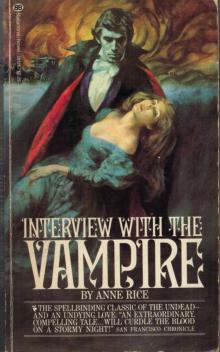 Interview with the Vampire
Interview with the Vampire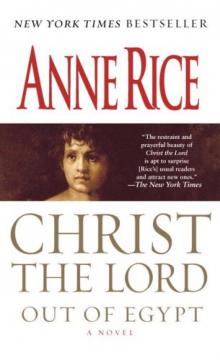 Christ the Lord: Out of Egypt
Christ the Lord: Out of Egypt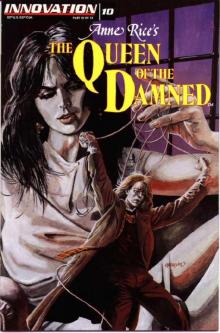 The Queen Of The Damned
The Queen Of The Damned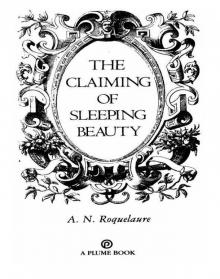 The Claiming of Sleeping Beauty
The Claiming of Sleeping Beauty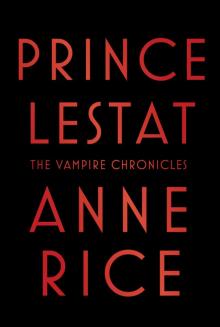 Prince Lestat
Prince Lestat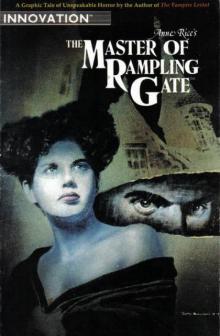 The Master of Rampling Gate
The Master of Rampling Gate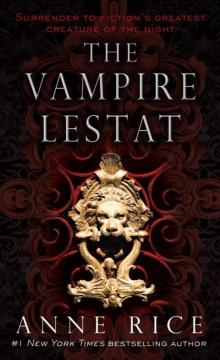 The Vampire Lestat
The Vampire Lestat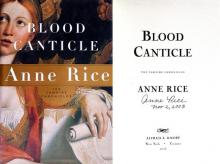 Blood Canticle
Blood Canticle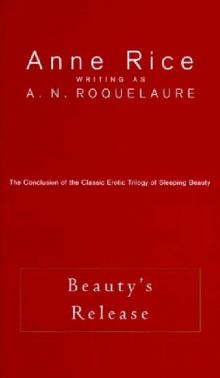 Beauty's Release
Beauty's Release Pandora
Pandora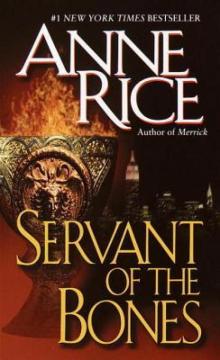 Servant of the Bones
Servant of the Bones Of Love and Evil
Of Love and Evil Beauty's Punishment
Beauty's Punishment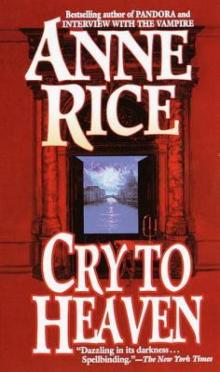 Cry to Heaven
Cry to Heaven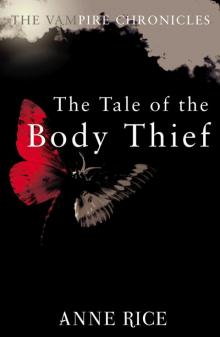 The Tale of the Body Thief
The Tale of the Body Thief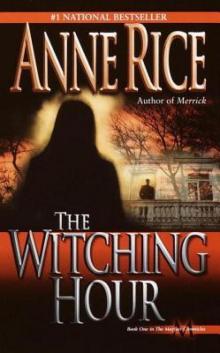 The Witching Hour
The Witching Hour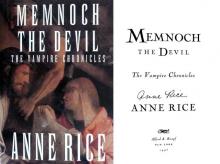 Memnoch the Devil
Memnoch the Devil Blackwood Farm
Blackwood Farm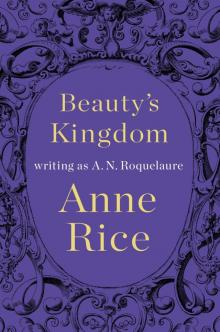 Beauty's Kingdom
Beauty's Kingdom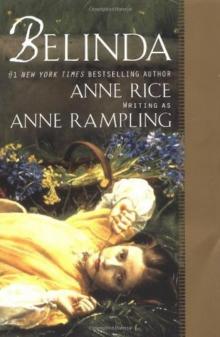 Belinda
Belinda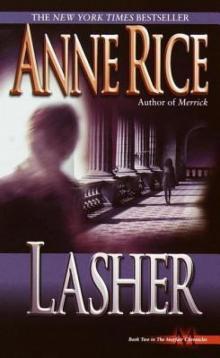 Lasher
Lasher Vittorio, the Vampire
Vittorio, the Vampire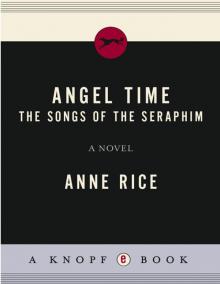 Angel Time
Angel Time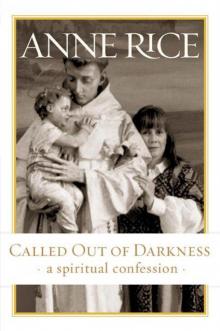 Called Out of Darkness: A Spiritual Confession
Called Out of Darkness: A Spiritual Confession Blood And Gold
Blood And Gold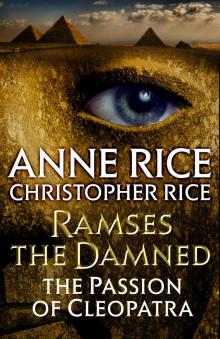 The Passion of Cleopatra
The Passion of Cleopatra Taltos
Taltos Exit to Eden
Exit to Eden Blood Communion (The Vampire Chronicles #13)
Blood Communion (The Vampire Chronicles #13) The Wolf Gift
The Wolf Gift The Wolves of Midwinter
The Wolves of Midwinter Prince Lestat and the Realms of Atlantis
Prince Lestat and the Realms of Atlantis The Ultimate Undead
The Ultimate Undead The Vampire Lestat tvc-2
The Vampire Lestat tvc-2 The Road to Cana
The Road to Cana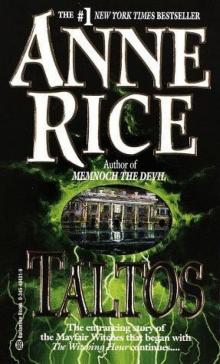 Taltos lotmw-3
Taltos lotmw-3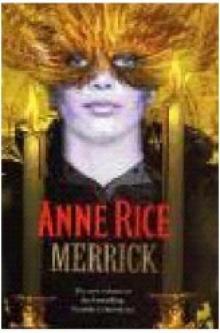 Merrick tvc-7
Merrick tvc-7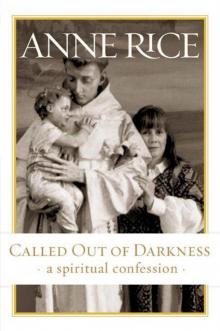 Called Out of Darkness
Called Out of Darkness Pandora - New Vampires 01
Pandora - New Vampires 01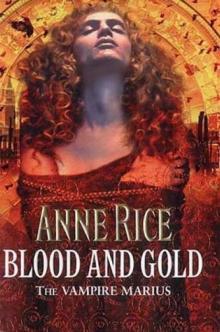 Bllod and Gold
Bllod and Gold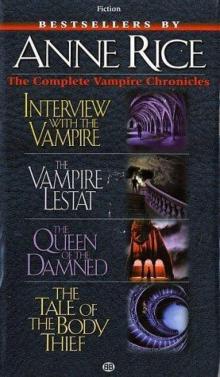 The Queen Of the Damned: Vampire Chronicles
The Queen Of the Damned: Vampire Chronicles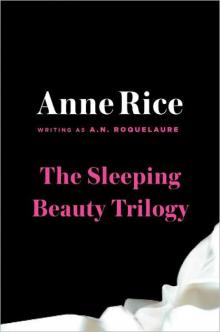 The Sleeping Beauty Trilogy
The Sleeping Beauty Trilogy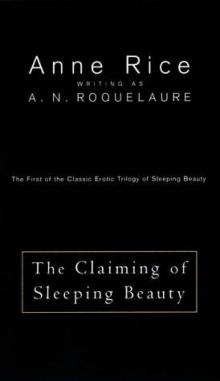 The Claiming of Sleeping Beauty b-1
The Claiming of Sleeping Beauty b-1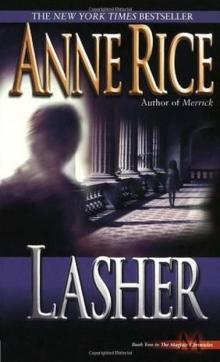 Lasher lotmw-2
Lasher lotmw-2 The Tale of the Body Thief tvc-4
The Tale of the Body Thief tvc-4 The Vampire Chronicles Collection
The Vampire Chronicles Collection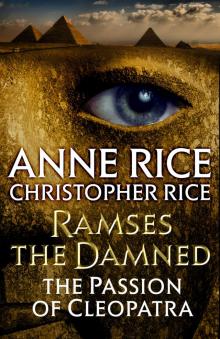 Ramses the Damned
Ramses the Damned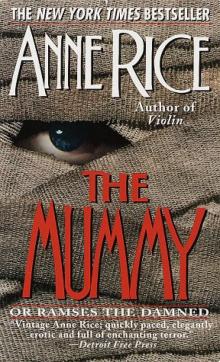 The Mummy - or Ramses the Damned
The Mummy - or Ramses the Damned Vittorio, The Vampire - New Vampires 02
Vittorio, The Vampire - New Vampires 02 The Vampire Armand tvc-6
The Vampire Armand tvc-6 Queen of the Damned tvc-3
Queen of the Damned tvc-3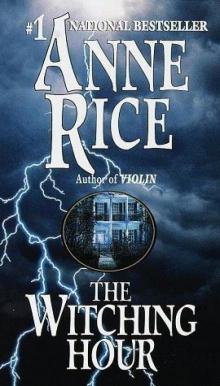 The witching hour lotmw-1
The witching hour lotmw-1 Feast of All Saints
Feast of All Saints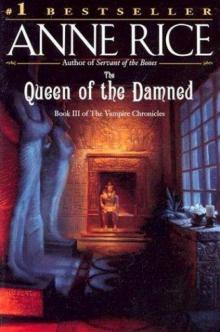 Queen of the Damned
Queen of the Damned The Wolves of Midwinter twgc-2
The Wolves of Midwinter twgc-2 The Mummy
The Mummy Blood and Gold tvc-8
Blood and Gold tvc-8 Blood Communion
Blood Communion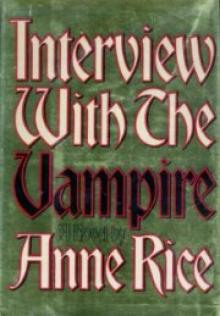 Interview with the Vampire tvc-1
Interview with the Vampire tvc-1 Prince Lestat: The Vampire Chronicles
Prince Lestat: The Vampire Chronicles